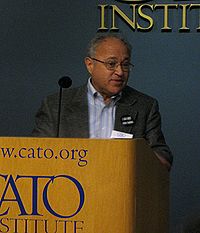- David D. Friedman
-
For other people of the same name, see David Friedman (disambiguation).
David Director Friedman Chicago School of Economics 
David Friedman discusses his recent book Future Imperfect at the Cato Institute, November 6, 2008.Born 12 February 1945 Nationality American Institution Santa Clara University Field Economics, Law Alma mater Harvard University
University of ChicagoInfluences Ronald Coase, Friedrich Hayek, Robert A. Heinlein, Milton Friedman, Adam Smith Influenced Bryan Caplan, Patri Friedman, Peter Leeson, Edward Stringham Contributions The Machinery of Freedom David Director Friedman (born February 12, 1945) is an American economist, author, and Right-libertarian theorist. He is known as a leader in anarcho-capitalist political theory, which is the subject of his most popular book, The Machinery of Freedom (1973, revised 1989). He has authored others, including Price Theory: An Intermediate Text (1986), Law's Order: What Economics Has to Do with Law and Why It Matters (2000), Hidden Order: The Economics of Everyday Life (1996), and Future Imperfect (2008).[1]
Contents
Life and work
David Friedman is the son of economists Rose and Milton Friedman. His son, Patri Friedman, has also written about anarcho-capitalism, particularly seasteading. David Friedman holds an A.B. from Harvard University and a Ph.D. in Physics from the University of Chicago, although he is most known for work in other fields. He is currently a professor of law at Santa Clara University, and a contributing editor for Liberty magazine. He is an atheist.[2]
Anarcho-capitalism
In his book The Machinery of Freedom (1973), Friedman sketched a form of anarcho-capitalism where all goods and services including law itself can be produced by the free market. This differs from the version proposed by Murray Rothbard, where a legal code would first be consented to by the parties involved in setting up the anarcho-capitalist society. Friedman advocates an incrementalist approach to achieve anarcho-capitalism by gradual privatization of areas that government is involved in, ultimately privatizing law and order itself. In the book, he states his opposition to violent anarcho-capitalist revolution.[3]
He uses a consequentialist version of anarcho-capitalism. Friedman's version of individualist anarchism is not based on the assumption of inviolable natural rights but rather rests on a cost-benefit analysis of state versus no state.[4] It is contrasted with the natural-rights approach as propounded most notably by Austrian School economist, libertarian theorist and anarcho-capitalist founder Murray Rothbard.
Non-academic interests
Friedman is a longtime member of the Society for Creative Anachronism, where he is known as Duke Cariadoc of the Bow. He is known throughout the worldwide society for his articles on the philosophy of recreationism and practical historical recreations, especially those relating to the medieval Middle East.[5] His work is compiled in the popular Cariadoc's Miscellany.[6] He is sometimes credited with founding the largest and longest-running SCA event, the Pennsic War; as king of the Middle Kingdom he challenged the East Kingdom, and later as king of the East accepted the challenge…and lost.[7]
He is a long-time science fiction fan, and has written a fantasy novel, Harald (Baen Books, 2006).
Bibliography
Nonfiction
- 1989 (1973). The Machinery of Freedom.
- 1990 (1986). Price Theory: An Intermediate Text Southwestern Publishing.
- 1996. Hidden Order: The Economics of Everyday Life.
- 2000. Law’s Order: What Economics Has to Do with Law and Why It Matters. Princeton Univ. Press.
- 2005. "The Case for Privacy" in Contemporary Debates in Applied Ethics. Wiley-Blackwell.
- 2008. Future Imperfect: Technology and Freedom in an Uncertain World.
Fiction
- Harald, 2006
- Salamander, 2011 (Kindle eBook)
References
- ^ Free Market Mojo. "An Interview with David D. Friedman".
- ^ Friedman, David D. "Atheism and Religion", Ideas.
- ^ Friedman, David D. "Revolution Is the Hell of It". The Machinery of Freedom. pp. 149–150. ISBN 0-8126-9069-9.
- ^ Morris, Christopher. 1992. An Essay on the Modern State. Cambridge University Press. p. 62.
- ^ Friedman, David D. "On Restructuring the SCA"
- ^ Cariadoc's Miscellany
- ^ F.L. Watkins (Fólki Þorgilsson). 2005. HERSTAĐR-SAGA: An Incomplete History of Pennsic © Folump Enterprises
External links
- Homepage
- Ideas Friedman's blog
- David D. Friedman speech at Authors@Google
- David D. Friedman at the Internet Speculative Fiction Database
- An interview with David Friedman on The Marketplace of Ideas
- An Interview with David D. Friedman on Free Market Mojo
Chicago school of economics Founders Monetarism Milton Friedman · Anna J. Schwartz · Karl Brunner · Phillip D. Cagan · Harry G. Johnson · Allan H. Meltzer · David E.W. LaidlerNew economic history New social economics Jacob Mincer · Gary Becker · James Heckman · Thomas Sowell · Sherwin Rosen · Kevin M. Murphy · John A. List · Steven Levitt · Roland FryerPublic choice school James M. Buchanan · Gordon Tullock · Randall Holcombe · Anthony Downs · William A. Niskanen · Bryan CaplanLaw and economics Ronald Coase · Aaron Director · William Landes · Richard Posner · Robert Bork · Frank H. Easterbrook · David D. FriedmanBusiness and finance Anarcho-capitalism 
Features Aggression insurance · Crime insurance · Dispute resolution organization · Free-market roads · Jurisdictional arbitrage · Non-aggression principle · Polycentric law · Private defense agency · Private Governance · Self-ownership · Spontaneous orderCategories:- American anarchists
- American economics writers
- American economists
- American libertarians
- American political writers
- American bloggers
- Anarchist academics
- Anarchist poets
- Individualist anarchists
- Free-market anarchists
- Anarcho-capitalists
- Friedman family
- American atheists
- Jewish atheists
- Libertarian economists
- Libertarian theorists
- Legal educators
- Science fiction fans
- Santa Clara University School of Law faculty
- Santa Clara University faculty
- Harvard University alumni
- University of Chicago alumni
- Usenet people
- 1945 births
- Living people
Wikimedia Foundation. 2010.
